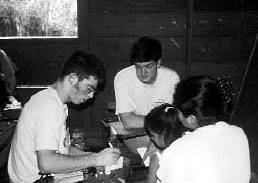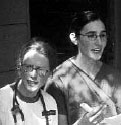Igniting the medical passions of undergrads
As dusk settled on a Nicaraguan village, the last yawning rays of light illuminated three figures hard at work in a corrugatedmetal shed: a Dartmouth doctor, a Nicaraguan patient, and Eric Wang, then a Dartmouth College senior. It had been a very long day for Wang, who was learning how, among other things, to identify eye cancer and to sensitively inform a patient of the affliction.
Wang was one of nine Dartmouth undergraduates who traveled last winter to Siuna, Nicaragua, with two Dartmouth doctors —William Young, M.D., and John Richardson, M.D.—and two members of the DMS Class of '02—Amy Vinther and Jenny Noon. In two weeks, the group provided preventive and acute care to over 700 patients.

|
|
|
Service: The visit was the first project of the Dartmouth-wide Cross-Cultural Education and Service Program. The program brings together resources from Dartmouth's professional schools to give students and faculty an opportunity to apply their academic knowledge to service in a developing country. In addition, it gives undergrads a chance to work with students and faculty from the graduate schools.
Nearly every undergraduate on the trip spent a day assisting Young, an associate professor of obstetrics and gynecology. He recalls that "the experience was insightful for many and uncomfortable for some, as they worked in tight confrontation with women's health problems prevalent in a developing country.
"At the same time," Young adds, the undergraduates "matured by working in the presence of a patient and doctor and developed an appreciation for the medical and social problems these women experience."
For example, the students observed women turning down a chance to be screened for cervical cancer because they thought it would cost an extra $3.00— until they learned that the team was funding the test.
The Dartmouth group also held two days of classes for 20 Nicaraguan midwives. "We all did a lot of listening," recalls Young. "Their stories were wonderful to hear."
Joel Wickre, then a junior, was a translator for the classes. He was so moved by Siuna's desperate need for clean water that he returned there in the spring to do an epidemiological study of the town's water system.
Drew Crapser, a senior, found the one-on-one conversations with the doctors and the medical students especially rewarding. "The free afternoon I spent with Amy Vinther stands out in my mind. During that afternoon, she shared with me why she decided to pursue medicine, and I've held that as one of my most meaningful experiences of the trip."
Junior John Myers, who had long planned to become a doctor and spend some time each year in a developing country, credits the trip with cementing this goal. "Talking with the medical students, I found that they were figuring out just as much as I was if they wanted to practice this type of medicine as part of their life's work," he recalls.
The undergraduates were also impressed with how much the medical students could do—take patient histories, suggest treatment options, and even perform minor surgical procedures.
Clinics: "I was intrigued that after a few years of medical school, Amy and Jenny were able to sit in the doctor's seat and direct the work in the clinics," says Myers. "To see that they could do that after just a few years in medical school made me much more confident that I wanted to attend medical school immediately rather than wait."
The medical students "were great with patients," says Wang, "but equally excited to empower undergrads to work with the patients ourselves. It struck me that, even in the midst of absences of clean water and microscopes, the doctors were going out of their way to teach us. They really modeled the positivity of being a doctor through their openness, care, and compassion."
Premeds sometimes wonder how much weight to give to tales of overworked American doctors and abstruse HMO policies. "Nicaragua avowed the humanness of this profession to me," says Wang. "Our doctors truly enjoyed what they were doing and were willing to share with us because of that enjoyment.
"More than anything else," he adds, "I learned there is hope in this job, and yet that medicine is more than just a job. I learned that one can serve as a role model in this profession through sharing one's own passions and encouraging those of another."
Adam Tanney
If you would like to offer any feedback about this article, we would welcome getting your comments at DartMed@Dartmouth.edu.

 Dartmouth undergraduates Joel Wickre
(above, left) and John Myers (above,
center) worked in Nicaragua with the
DMS students on the left: Jennifer
Noon (left) and Amy Vinther (right).
Dartmouth undergraduates Joel Wickre
(above, left) and John Myers (above,
center) worked in Nicaragua with the
DMS students on the left: Jennifer
Noon (left) and Amy Vinther (right).